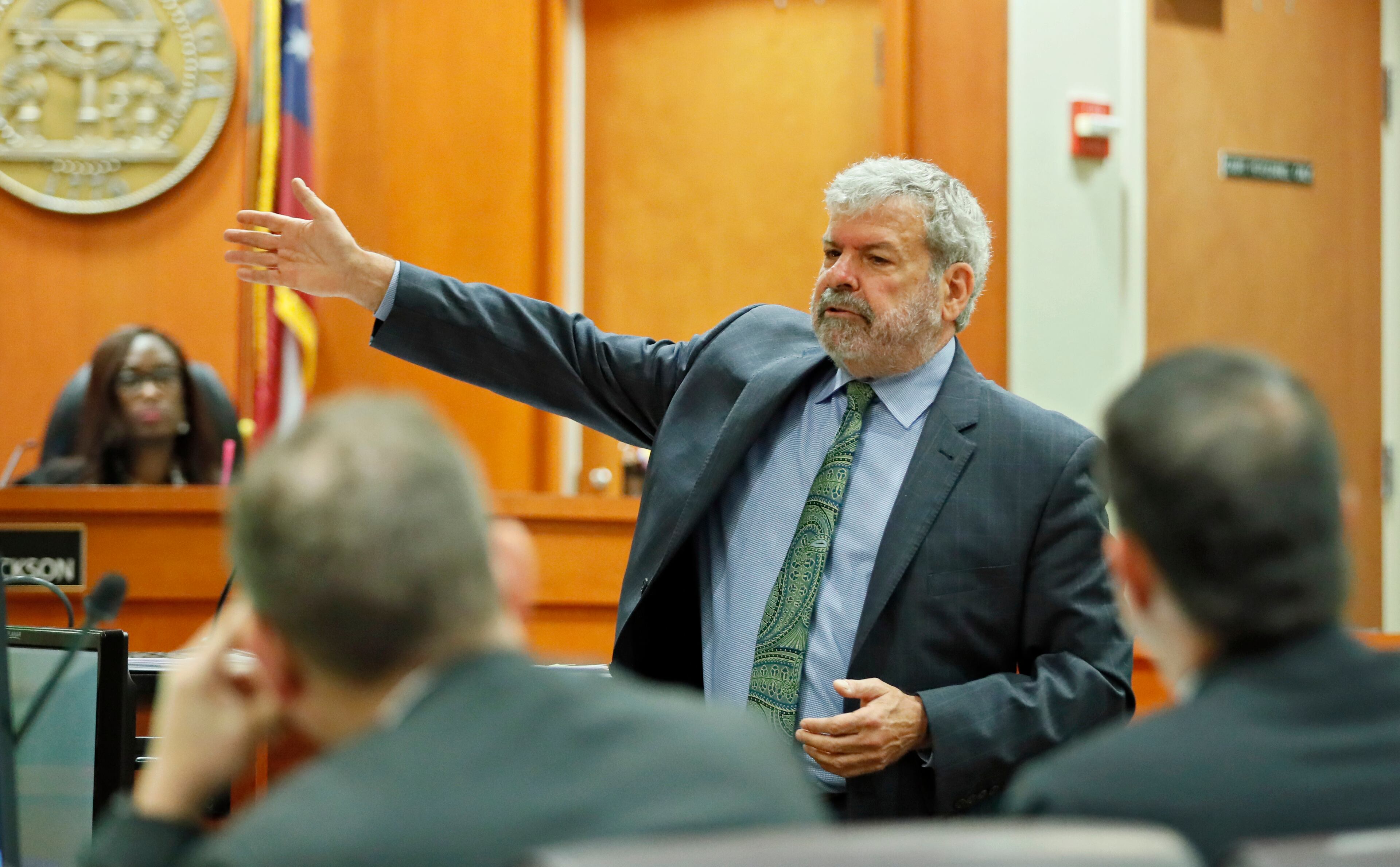State discloses plea offer rejected by ex-DeKalb cop charged with murder

A former DeKalb County police officer charged with killing an unarmed Afghanistan war veteran rejected a plea deal that would’ve required him to serve 15 years in prison, a prosecutor disclosed Friday.
Robert “Chip” Olsen faces a possible life sentence if convicted of murdering 27-year-old Anthony Hill. Jury selection begins Monday morning, more than four years after Olsen, 57, shot Hill outside his Chamblee apartment complex.
At the close of a lengthy pretrial hearing, DeKalb County Chief Assistant District Attorney Pete Johnson detailed the plea offer that had been turned down by Olsen: 20 years, with 15 years in prison followed by five years on probation. As Johnson made the disclosure, Olsen showed no emotion and sat at the defense table staring straight ahead, as he did throughout the hearing.
What Olsen’s jury will be allowed to hear remains in question following the spirited motions hearing Friday.
The defense argued that evidence about Hill’s mental illness is irrelevant to Olsen’s guilt or innocence. Defense co-counsel Amanda Clark Palmer said that information could lead jurors to become overly sympathetic to the U.S. Air Force veteran.

“What the jury is going to be asked to decide is what was Officer Olsen’s state of mind,” defense co-counsel Clark Palmer said. “Not Anthony Hill’s state of mind.”
Olsen, she said, didn’t know that Hill suffered from bipolar disorder and was off his medications when he ran, naked, towards the officer on March 9, 2015.
Testimony about Hill’s military service could also be prejudicial to Olsen, his lawyers argued.
Olsen listened intently, fixing his gaze straight ahead throughout the hearing.
RELATED:
Prosecutors, defense spar in advance of DeKalb cop’s murder trial
Defense seeks to bar war veteran’s past in DeKalb police shooting case
DeKalb officer indicted on murder charges in shooting of unarmed civilian
Lead prosecutor Johnson said the state plans to call Hill’s mother, girlfriend and roommate to provide “general background information.”
“Anthony Hill didn’t just drop out of the sky into the Heights of Chamblee apartments,” countered Johnson. “He was a living human being prior to being killed.”
Judge LaTisha Dear Jackson has yet to rule on the motions.
Prior to Friday’s hearing, the two sides reached consensus on a few issues. The defense agreed to exclude evidence that marijuana was found in Hill’s system. The state will not introduce testimony about past civilian complaints lodged against Olsen.
Hill’s favorable views of law enforcement, aired on social media following a controversial officer-involved shooting in Ferguson, Mo., also will not be explored by the state.

Of potentially greater consequence: The defense’s motion to prohibit evidence about DeKalb police’s use of force policy. The underlying felony in the murder count against Olsen alleges he violated his oath of office by not following county policy when he shot and killed the unarmed Hill.
The defense contends DeKalb’s rules are for department use only and should not apply in a criminal proceeding. Olsen testified in an immunity hearing last year that he acted in self-defense, and Georgia’s stand your ground law trumps county guidelines for its law enforcement officers, said defense co-counsel Don Samuel.
“There are voluminous provisions in use of force policy that are inconsistent with (the state’s self-defense law),” Samuel said.

In essence, the state is arguing that Olsen, as a police officer, should be held to a higher standard. The defense wants jurors to see their client as any other “reasonable person” who feared for his safety and acted in compliance with Georgia’s self-defense statute.
DeKalb officers have a duty to retreat. But Georgia is a stand your ground state, with no such obligation.
“Is the jury going to be allowed to say, the defendant didn’t use great restraint, therefore he’s guilty of murder?” Samuel said.
Johnson said the use of force policy reflects the self-defense statute ‘s mandate that the subjects “act reasonably.” They are not in conflict, he said.
“Pretty much everything (Samuel) said is not accurate about the state’s position,” Johnson said.

Dear Jackson asked Johnson how the state reconciles the use of force policy which states the policy should not apply in a criminal trial.
Johnson said the charge isn’t grounded in the violation of the use of force policy but in violating his oath of office.
“What the defense wants is their client not to be a police officer,” Johnson said. “What they really want is two blank slates who met in a parking lot.”



